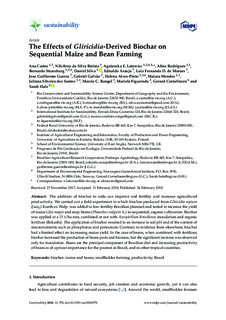The Effects of Gliricidia-Derived Biochar on Sequential Maize and Bean Farming
Castro, Ana; da Silva Batista, Nilcileny; Latawiec, Agnieszka E.; Rodrigues, Aline; Strassburg, Bernardo; Silva, Daniel; Araujo, Ednaldo; de Moraes, Luiz F.; Guerra, Jose G.; Galvão, Gabriel; Alves-Pinto, Helena; Mendes, Maiara; dos Santos, Juliana S.; Rangel, Marcio C.; Figueredo, Mariela; Cornelissen, Gerard; Hale, Sarah
Peer reviewed, Journal article
Published version
Permanent lenke
http://hdl.handle.net/11250/2493267Utgivelsesdato
2018Metadata
Vis full innførselSamlinger
- NGI articles [1061]
Sammendrag
The addition of biochar to soils can improve soil fertility and increase agricultural productivity. We carried out a field experiment in which biochar produced from Gliricidia sepium (Jacq.) Kunth ex Walp. was added to low-fertility Brazilian planosol and tested to increase the yield of maize (Zea mays) and snap beans (Phaseolus vulgaris L.) in sequential, organic cultivation. Biochar was applied at a 15 t/ha rate, combined or not with Azospirillum Brasiliense inoculation and organic fertilizer (Bokashi). The application of biochar resulted in an increase in soil pH and of the content of macronutrients such as phosphorus and potassium. Contrary to evidence from elsewhere, biochar had a limited effect on increasing maize yield. In the case of beans, when combined with fertilizer, biochar increased the production of beans pods and biomass, but the significant increase was observed only for inoculation. Beans are the principal component of Brazilian diet and increasing productivity of beans is of upmost importance for the poorest in Brazil, and in other tropical countries
